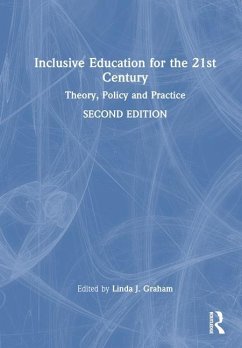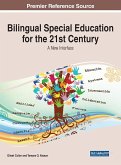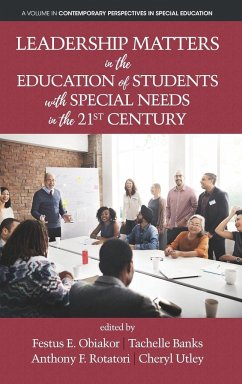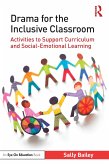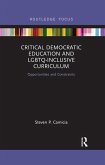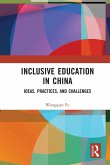Inclusive Education for the 21st Century
Theory, Policy and Practice
Herausgeber: Graham, Linda J.
Inclusive Education for the 21st Century
Theory, Policy and Practice
Herausgeber: Graham, Linda J.
- Gebundenes Buch
- Merkliste
- Auf die Merkliste
- Bewerten Bewerten
- Teilen
- Produkt teilen
- Produkterinnerung
- Produkterinnerung
Inclusive Education for the 21st Century provides a rigorous overview of the foundational principles of inclusive education and the barriers to access and participation.
Andere Kunden interessierten sich auch für
![Bilingual Special Education for the 21st Century Bilingual Special Education for the 21st Century]() Bilingual Special Education for the 21st Century224,99 €
Bilingual Special Education for the 21st Century224,99 €![Leadership Matters in the Education of Students with Special Needs in the 21st Century Leadership Matters in the Education of Students with Special Needs in the 21st Century]() Leadership Matters in the Education of Students with Special Needs in the 21st Century106,99 €
Leadership Matters in the Education of Students with Special Needs in the 21st Century106,99 €![Alternative Education in the 21st Century Alternative Education in the 21st Century]() Karen HladyAlternative Education in the 21st Century44,99 €
Karen HladyAlternative Education in the 21st Century44,99 €![bell hooks' Engaged Pedagogy for the 21st Century Classroom bell hooks' Engaged Pedagogy for the 21st Century Classroom]() bell hooks' Engaged Pedagogy for the 21st Century Classroom101,99 €
bell hooks' Engaged Pedagogy for the 21st Century Classroom101,99 €![Drama for the Inclusive Classroom Drama for the Inclusive Classroom]() Sally BaileyDrama for the Inclusive Classroom47,99 €
Sally BaileyDrama for the Inclusive Classroom47,99 €![Critical Democratic Education and LGBTQ-Inclusive Curriculum Critical Democratic Education and LGBTQ-Inclusive Curriculum]() Steven CamiciaCritical Democratic Education and LGBTQ-Inclusive Curriculum30,99 €
Steven CamiciaCritical Democratic Education and LGBTQ-Inclusive Curriculum30,99 €![Inclusive Education in China Inclusive Education in China]() Wangqian FuInclusive Education in China61,99 €
Wangqian FuInclusive Education in China61,99 €-
-
-
Inclusive Education for the 21st Century provides a rigorous overview of the foundational principles of inclusive education and the barriers to access and participation.
Hinweis: Dieser Artikel kann nur an eine deutsche Lieferadresse ausgeliefert werden.
Hinweis: Dieser Artikel kann nur an eine deutsche Lieferadresse ausgeliefert werden.
Produktdetails
- Produktdetails
- Verlag: Routledge
- 2. Auflage
- Seitenzahl: 420
- Erscheinungstermin: 8. Dezember 2023
- Englisch
- Abmessung: 250mm x 175mm x 27mm
- Gewicht: 900g
- ISBN-13: 9781032396866
- ISBN-10: 1032396865
- Artikelnr.: 68473170
- Herstellerkennzeichnung
- Libri GmbH
- Europaallee 1
- 36244 Bad Hersfeld
- gpsr@libri.de
- Verlag: Routledge
- 2. Auflage
- Seitenzahl: 420
- Erscheinungstermin: 8. Dezember 2023
- Englisch
- Abmessung: 250mm x 175mm x 27mm
- Gewicht: 900g
- ISBN-13: 9781032396866
- ISBN-10: 1032396865
- Artikelnr.: 68473170
- Herstellerkennzeichnung
- Libri GmbH
- Europaallee 1
- 36244 Bad Hersfeld
- gpsr@libri.de
Linda J. Graham is Professor and Director of The Centre for Inclusive Education (C4IE) at Queensland University of Technology (QUT). She leads several externally funded research projects specialising in the inclusion and exclusion of students who experience difficulties in school and with learning.
Part 1: Foundations of Inclusion 1. Inclusive education: Three (and a bit)
Years On 2. What is Inclusion... And What is it Not? 3. Inclusive education
as a human right 4. Fundamental concepts of inclusive education 5. The
legal foundations of inclusion 6. Inclusive Education: A Review of the
Evidence Part 2: Implementing Systemic Inclusive Education Reform 7.
Learning from international experience 8. Leading inclusive education
reform 9. Multi-Tiered Systems of Support: What are they, where did they
come from, and what are the lessons for Australian Schools? 10. The
critical importance of language 11. Accessible Pedagogies 12. Including
students with complex learning profiles in grade-level curriculum Part 3:
Developing an Inclusive School Culture 13. Putting all students at the
centre 14. What is Social Emotional Learning (SEL) and why is it important?
15. Supporting a sense of belonging and peer relationships 16. Nurturing
close student-teacher relationships 17. Parents and teachers working
together 18. Collaborating with colleagues and other professionals 19.
Rethinking the use of teacher aides
Years On 2. What is Inclusion... And What is it Not? 3. Inclusive education
as a human right 4. Fundamental concepts of inclusive education 5. The
legal foundations of inclusion 6. Inclusive Education: A Review of the
Evidence Part 2: Implementing Systemic Inclusive Education Reform 7.
Learning from international experience 8. Leading inclusive education
reform 9. Multi-Tiered Systems of Support: What are they, where did they
come from, and what are the lessons for Australian Schools? 10. The
critical importance of language 11. Accessible Pedagogies 12. Including
students with complex learning profiles in grade-level curriculum Part 3:
Developing an Inclusive School Culture 13. Putting all students at the
centre 14. What is Social Emotional Learning (SEL) and why is it important?
15. Supporting a sense of belonging and peer relationships 16. Nurturing
close student-teacher relationships 17. Parents and teachers working
together 18. Collaborating with colleagues and other professionals 19.
Rethinking the use of teacher aides
Part 1: Foundations of Inclusion 1. Inclusive education: Three (and a bit)
Years On 2. What is Inclusion... And What is it Not? 3. Inclusive education
as a human right 4. Fundamental concepts of inclusive education 5. The
legal foundations of inclusion 6. Inclusive Education: A Review of the
Evidence Part 2: Implementing Systemic Inclusive Education Reform 7.
Learning from international experience 8. Leading inclusive education
reform 9. Multi-Tiered Systems of Support: What are they, where did they
come from, and what are the lessons for Australian Schools? 10. The
critical importance of language 11. Accessible Pedagogies 12. Including
students with complex learning profiles in grade-level curriculum Part 3:
Developing an Inclusive School Culture 13. Putting all students at the
centre 14. What is Social Emotional Learning (SEL) and why is it important?
15. Supporting a sense of belonging and peer relationships 16. Nurturing
close student-teacher relationships 17. Parents and teachers working
together 18. Collaborating with colleagues and other professionals 19.
Rethinking the use of teacher aides
Years On 2. What is Inclusion... And What is it Not? 3. Inclusive education
as a human right 4. Fundamental concepts of inclusive education 5. The
legal foundations of inclusion 6. Inclusive Education: A Review of the
Evidence Part 2: Implementing Systemic Inclusive Education Reform 7.
Learning from international experience 8. Leading inclusive education
reform 9. Multi-Tiered Systems of Support: What are they, where did they
come from, and what are the lessons for Australian Schools? 10. The
critical importance of language 11. Accessible Pedagogies 12. Including
students with complex learning profiles in grade-level curriculum Part 3:
Developing an Inclusive School Culture 13. Putting all students at the
centre 14. What is Social Emotional Learning (SEL) and why is it important?
15. Supporting a sense of belonging and peer relationships 16. Nurturing
close student-teacher relationships 17. Parents and teachers working
together 18. Collaborating with colleagues and other professionals 19.
Rethinking the use of teacher aides

